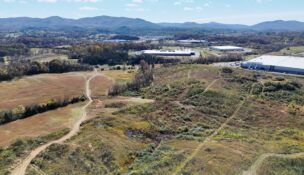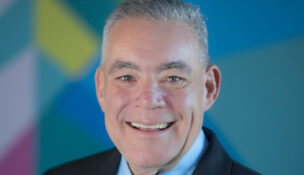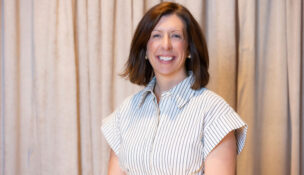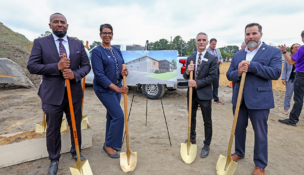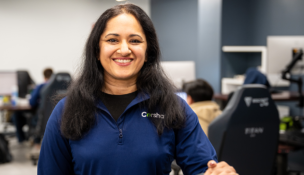A sense of possibility
Commonwealth Cyber Initiative’s first executive director aims high
Tim Thornton //August 29, 2020//
A sense of possibility
Commonwealth Cyber Initiative’s first executive director aims high
Tim Thornton //August 29, 2020//
Luiz DaSilva became the inaugural executive director of Virginia’s Commonwealth Cyber Initiative (CCI) in March, returning to Virginia Tech after two years in Ireland, where he served as the director of CONNECT, a telecommunications research center at Trinity College Dublin involving 35 companies and 250 researchers from 10 Irish universities.
CONNECT’s goal is to produce research and intellectual property that could lead to commercial enterprises, while preparing students to work with innovative technology. And as the head of CCI, DaSilva will lead more than 320 researchers at 21 universities and 16 community colleges across Virginia, along with 87 industry partners, in a similar pursuit.
Located in the Virginia Tech Research Center in Arlington, CCI is a state initiative aimed at making Virginia a global leader in the field of secure cyberphysical systems, linking computing power to sensors and controls in the physical world. CCI will foster partnerships between industry, higher education and government. It’s also focused on promoting research at the intersection of data, autonomy and security, as well as promoting technology commercialization and entrepreneurship.
Born in Brazil, DaSilva studied and taught at the University of Kansas, worked at IBM Brazil and was a professor for 17 years in Virginia Tech’s Bradley Department of Computer and Electric Engineering.
“When I was a boy in Brazil, I really wanted to see the world, so this was part of what I really dreamt about,” DaSilva says. “At the time, it was difficult to do it. People didn’t travel that much. Brazil was under a dictatorship. We were very closed as a country and so on, but I ended up having the opportunity to do that, to actually see the world and also live on these three different continents.”
DaSilva thinks that experience helps him bring different perspectives and approaches to his work. “Brazil is this very lively place, very vibrant, very happy place, in a way, but with all of the challenges of a developing country,” he says. “Europe has this huge sense of history and social responsibility, but maybe not as dynamic as the U.S. The U.S. has this sense of everything is possible. It tends to inspire people’s dreams because there’s this huge sense of possibility. They all bring different things to the table, and by being exposed to these different ways of thinking, I think you end up being able to take the best from each of the three continents.”
The work he did on those three continents helped him convince the CCI search committee that he was their man.
“During the search process, Luiz showed he had the experience and insight needed to bring together multiple institutions towards a common goal,” says Brian Payne, vice provost for academic affairs at Old Dominion University, director of a regional node of CCI and a member of the search committee. “When asked about how to promote collaboration, Luiz didn’t just talk about principles of collaboration or ideals. He gave very specific examples of how he led collaborative efforts in his prior position. These experiences made him a perfect fit for this position.”
DaSilva heard about the CCI job by chance, when a friend at Virginia Tech was catching him up on what was happening at the university. It appealed to him right away.
“I felt it was a really unique opportunity,” DaSilva says, “a really different kind of institute or initiative involving so many universities, community colleges, and the entire ecosystem … where the real challenge is to translate all this excellent research that takes place in the universities into some economic impact.”
Virginia Business spoke with DaSilva in July, four months and a week into his new job.
Virginia Business: Talk a little bit about the CCI’s mission: creating an entrepreneurial ecosystem; developing talent; promoting and facilitating research and collaboration. Why is that important for the commonwealth? What does it mean for us?
Luiz DaSilva: I think what it means is that there’s a huge ambition on the part of the commonwealth to have a more diversified economy and to be able to attract in a lot of the new technology and all of the industry that’s going to form around some of the hot areas in technology like cybersecurity or autonomous systems and so on. To do that, you have to have a number of components to make it all work. One is definitely to have the workforce that is ready for these companies to recruit. If we can generate students who are well-versed in all of these topics and who can navigate these new technologies that are just emerging, that’s a big attractor for the new companies.
The other way that you generate some of this entrepreneurial ecosystem is, of course, taking some of the innovations that come out of the university system and translating those into new companies, startups and intellectual property that gets then incorporated into startups or licensed to larger companies. You need all of these pieces to come together. Probably we don’t have a single university who can spark all of that. Bringing together all of these universities around the state is a way to do it.
VB: CCI has lofty goals and a commitment of $20 million a year from the state. What is your work going to mean to a typical Virginian or the typical Virginia business? What are we going to get for our money?
DaSilva: I think what we will all get is a more vibrant economy, an economy that’s more diversified and that establishes leadership in some of these areas that are just getting started, like autonomous systems. If we can have this sort of impact, this will already be huge, and it will be, I think, visible to citizens in different ways. Hopefully, they’ll see it in a way that they don’t associate with CCI specifically, but they’ll see an economy that is strong, that has jobs, and especially some high-value jobs. They will see Virginia recognized for leadership in technology, just like Silicon Valley is in California, for example. I think that is going to be the mark of success.
VB: CCI awarded its first round of grants in June. Why were those programs chosen?
DaSilva: We issued a call for proposals for experiential learning opportunities. What we wanted to do is complement the opportunities that students already had in the programs that they follow in the community colleges and universities. Virginia actually has a very rich ecosystem of cybersecurity programs at the undergraduate level, at the graduate level, certificates. It’s very impressive how many different programs and with different flavors the students can choose from. While we don’t want to replicate any of that, we just want to give something on top of what already exists.
The big consideration … in terms of, does this add to the existing programs in cybersecurity, … is [is this] open to as many students as possible around Virginia? … We wanted to increase the diversity of the students involved. … We ended up picking six projects, and they all have different characteristics, and they all do something a little bit different. Two of them are centered on internships, one specifically for startups and one broader for all kinds and sizes of companies.
There’s one that establishes a drone racing competition for all Virginia students. … They can program the drone, and they’ll do a drone race sometime in 2021. There’s one that brings students to work with machine learning algorithms, using a particular dataset from satellite data. Each of them has a different opportunity, but they all give students the opportunity to be involved in a really hands-on manner in something that is relevant to industry and … that’s not typically part of their academic programs.
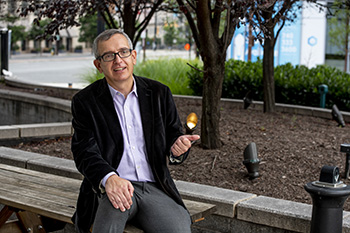
VB: Drone racing sounds like it would be too much fun to be useful!
DaSilva: That’s how you get people involved! You need to create programs that spark people’s imaginations and that sound fun because technology is not drudgery. It’s not just programming and sitting behind a computer. Increasingly, I think that technology has to do with connecting to the cyberphysical systems. These are things like drones or robots who move around in the environment but they require connectivity at all times. … The ultimate competition is fun, but for you to compete, you actually need to think about the strategy; you need to think about the solution. How do you program these drones to move? How do you keep them connected and so on?
VB: The vision is that someday there’ll also be students who are trying to hack into drones. That’s part of it too, right?
DaSilva: Right. The initial competition, as envisioned by the researchers who were working on it, has more to do with the autonomous operation of the drone, this idea that you don’t have to have a joystick but the drone can fly on its own and so on. [But] every time that you enable this sort of technology, the flip side is that you also potentially open up a new vulnerability and with very serious consequences, of course, especially when you’re dealing with these cyberphysical systems, which usually have some physical embodiment. If you hack into them, then you can cause a lot of damage. You can cause a drone to crash, you can cause a car to speed up and so on and so forth. … Yes, we want to advance the programmability of these systems, but also in a way that is secure, that cannot be easily hacked into and cause a serious accident.
VB: There’s a history of when we develop things on the internet, somebody breaks into them and then after the fact, we figure out some sort of security measure. But you can’t afford to do that with something like a car, right?
DaSilva: Right. I think you’re totally right that security sometimes is an afterthought. You do something and then people hack into it and then you patch the problem, etc., but I don’t think we can afford to do that with many of these new systems. I think we need to make sure that security is part of the design process in these systems, and we need to find ways to certify some of these systems as being secure enough to deploy.
VB: The day you became the CCI’s executive director, the United States had 30 COVID-19 cases; now we’re approaching 5.5 million [as of mid-August]. What kind of challenges has that presented to your initiative, which is predicated on getting 320 researchers, 87 companies and students, ranging from high schools to graduate schools, all working together?
DaSilva: Within this initial phase … what I would have wanted to do is bring everyone together physically and actually get to know people, not just in seminars and so on, but also during the coffee breaks and do all the networking. That is the part that we haven’t been able to do. That’s a bit challenging. Like everyone else, we have been finding ways to work around it.
I think we’re still in that phase where we take the technology that was out there and then we make do with the needs that we are facing right now. … It’s a huge challenge to start a new initiative like this, but I think it’s also the right time to be thinking about innovation in this phase because we need more innovation more than ever.
We’re already talking about things like contact tracing and how to do that in a way that respects people’s privacy. There needs to be a lot of new invention and innovation in that space, and that’s exactly the space of CCI. I think that’s the opportunity side of things. We have also been a bit fortunate that our research is, of course, the very use of technology, so people can do a lot of things remotely. Of course, there are jobs that really require physical presence, but for us, at least, in a short period of time, there’s a lot that we can do, given the current teleworking moments that we’re in.
VB: In a column for the Richmond Times-Dispatch, you wrote that COVID-19 may have accelerated the adoption of technology for teleworking and autonomous systems by a decade or more. How has that happened?
DaSilva: I think we’re still in the making-do part, but [teleworking] has been incorporated into professions that really were not thinking about [it] for a long time. I have two brothers. They’re both in the health care profession. I’ve started to see them start to use telemedicine a bit modestly, but it’s something that certainly was not on their radar for the short term. They’ve been forced to start doing it as a way to continue, at least, doing first contact with the patient and initial triage of symptoms. I see people start coming up with new ways to do physical therapy, to do personal training. For example, I’ve seen personal trainers working on Zoom and so on.
[There’s] not much innovation in technology yet, but [there’s] innovation in starting to adopt the technology that exists for new purposes. I think once that happens, that creates a market that will then accelerate new technologies being developed specifically. There may be something that’s very specific for telemedicine or something that’s very specific for personal trainers … whereas, six months ago, [that] was really a thing of the future.
The other example that I can give you that I think is very impressive and is Virginia-based is the use of drones for delivery. When people started talking about using drones for delivery, it was kind of science fiction, at least to me. I didn’t fully believe it. Then about three years ago, Virginia Tech had a program with Chipotle for delivery of burritos on campus, in specific locations. It was not everywhere, you had to go to a particular location, but it was great to test things out.
In Christiansburg, of course, there’s a commercial service now [using] drone delivery. [Editor’s note: Wing Aviation, a subsidiary of Google’s parent company, Alphabet Inc.] They keep expanding the businesses that choose it. I think Walgreen uses it. There’s two coffee shops that now deliver coffee. This is something that is happening much faster than I expected. I think we’ll keep seeing that because now there’s more of a need. There’s a lot more delivery of goods than there used to be during this time.
No-contact delivery also has a lot of interest, so [there’s an advantage to] having a drone [deliver goods] rather than having to have contact with a person. I think we’ll keep seeing that. We’ll keep seeing that in the autonomous vehicles space, in the manufacturing space, where the technology was evolving, but now it’s going to evolve faster and reach the market faster than it would have otherwise.
Subscribe to Virginia Business.
-




